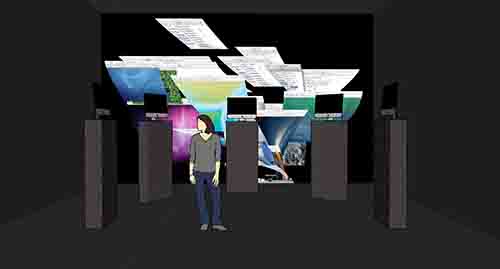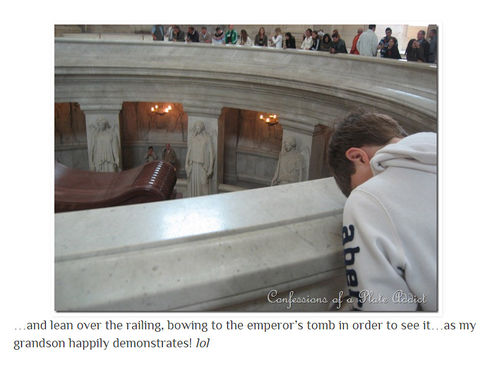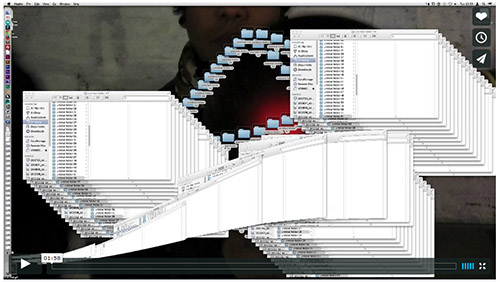User:Zigbe/GradProposal
Sistema Operacional: The Unbearable Lightness of the Invisible Power Structure of Things (working title)
{project}
Sistema Operacional is an audio/visual installation built inside a room, it intends to make the viewer experience oppression and reference the feeling back to the iconic references (eg. Apple Computer) inside the room. The installation should occupy a room by itself which might be accessed by doorways on both sides, or a contained space with one way in entrance. One (or more) computer will be placed in the room as a central point of control. Wired to other machines such as projectors, speakers, other computers, this central computer will send information to activate and control each machine. The computer performing a conductor for a technological orchestra while displying the proccesses on its screen. Space interferences juxtaposed by sound and moving image will create a sensory experience for the viewer.
Space interferences are changes on the space that are designed to be invisible and yet have an effect on the viewers behavior. For example: I can imagine the only access to the room to be through a door that once one is inside and wants to exit the space the door takes a few seconds to unlock, giving the brief feeling of being locked inside the room, which might bring to a short panic; The computer(s) positioned on top of two meters high monolith-like-stands establishing a power relation between itself and the viewer; the projected area taking a full wall in order to control the size and position of an image on that wall; speakers spread around reproducing different sounds; strong lights that might dim or flicker in different moments. I like to think how Napoleon's tomb was built in way that people have to bow in order to have a good view of the architecture, while his tomb is raised some meters up from the floor with an oculus on top. An architectural gesture which leaves the viewer with the feeling of being small close to his remains.
I've chosen to call the project an Opera inspired both by the miss-use of the term as well by Wagner's Gesamtkunstwerk (total work of art). In this case the “total work of art” comes ironically with the idea of using several medias in one a/v piece as an immersive experience. The miss-use of the term “Opera” comes with the fact that I don't intend to follow several of its classic notions, borrowing the ones that interests me the most, and again referencing Wagner with the pretension to reform the term. Nevertheless in this project's case there will be no reform of the term but détournement, by hijacking it I intend to use “spectacular images and language to disrupt the flow of the spectacle." An important factor of this disruption is brought by the use of Apple's Mac OS X environment - the most spectacular of all Operating Systems – as the control center for the whole piece.
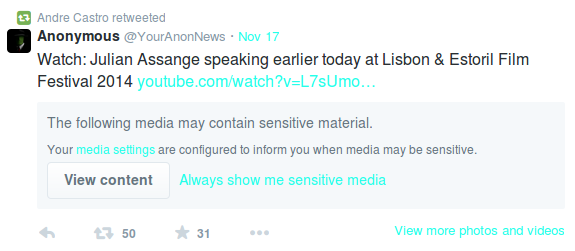
Twitter warns that Julian Assange might say something disturbing.
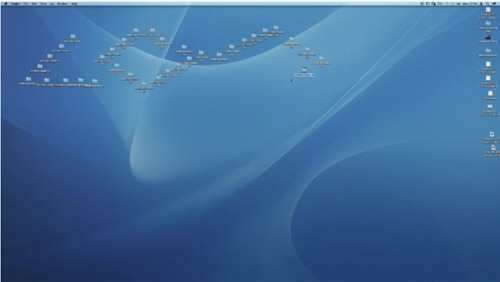
Drama: using Hunger Games sound track to provoke emotion to system animations.
https://vimeo.com/112978940
The play reflects a personal obsession on observing how mainstream media and design are used to educate us. In one of my sketches I play with how a scene from the film The Dark Knight Rises (2012) is designed to shape the general opinion on Occupy Wall-Street by distorting several key elements of the event. The anonymous leader introduces a revolution, in one scene violent youth crowd destroy an apartment, the police is depicted helpless looking down. This scene is an example of when the representation of the OWS is opposite to what has happened without being explicit about it. By bringing references to the OWS such as youth on the streets, “PEOPLE”, police, violence but deconstructing it from its original context, I believe it helps to reconstruct the image with the new meaning. It intend to tell us how to judge such situations as if it saves us from the hassle to think about it and normalize our opinion. The film was released one year after the end of the event, as if trying to give a criminal image to the people manifesting and raising the idea that with those people in power “chaos will lead us”. At the same time cleaning the image of the police's abuse of violence documented with smart phone's cameras and spread through social networks. The same year the film is released Apple patents (U.S. Patent No. 8,254,902) an "Apparatus and methods for enforcement of policies upon a wireless device", a feature which enables a way to "chang[e] one or more functional or operational aspects of a wireless device [...] upon the occurrence of a certain event" remotely. Giving the government the power to turn off the camera or prevent "wireless devices from communicating with other wireless devices" or even "forcing certain electronic devices to enter "sleep mode" when entering a sensitive area". I hope with those previous examples draw a rough illustration of the political interest behind the things we consume.
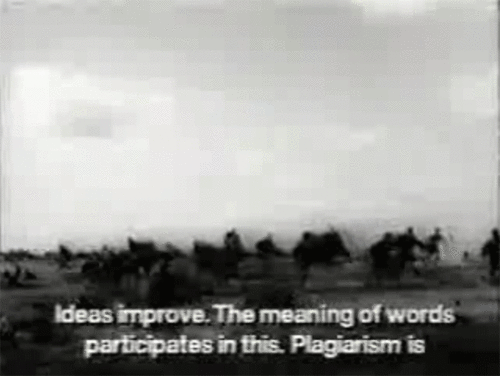
From the film Society of the Spectacle. The feedback
loop of information. Copy, modify, change meaning.
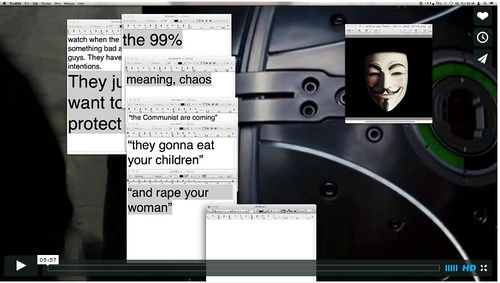
Playing with live interpretation.
https://vimeo.com/112978941
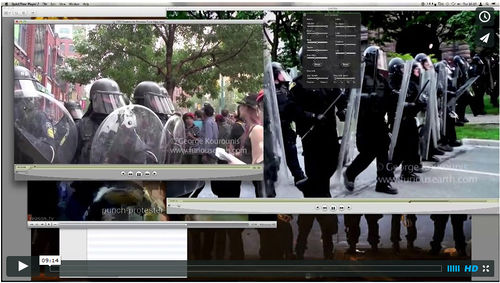
Here the soundscape is more important than the images selected. Second half has more interesting composition
https://vimeo.com/112983197
By researching on Occupy Wall-Street footage my interest was mostly by phone footage captured by manifestants. The subjectivity of those videos seemed to share the experience of the person filming it which lead me to realize my interest for the feeling of being oppressed and focus on that experience. Another influential footage displays kids playing a war-game with fireworks on the street. Despite the violent look of the game, it also displays the fun the people are having while playing it. The sound atmosphere captured by the film together with the phone footage is similar to the OWS videos, but different in content. This disparity creates a quite special contrast between both subjects. This sort of juxtaposition interests me as a form to avoid the representation of the event but highlighting its uncomfortable violence.
{project's framework}
As each part of this process lead me to a different spot in researching how to build this oppressive experience. In order to write the score for the play, I intend to continue speculating on different subjects on this realm for the next couple of months (January and February), creating an audio-visual vocabulary of experiments which will lead to the creation of the language necessary to create the score. As an example the image of rhythms the riot police build by hitting their shields in order to scary manifestants lead me to play with disturbing sounds which might bring a psychological effect. The loop of a police man punching a manifestant which stops just before the moment of hitting the manifestant's face might create a mental continuation of the image. Once I have a language with the collection of experiments, I will select and organizing the pertinent experiments and work them within a space. And by March I want dedicate the month to produce the final products such as high quality recordings, objects and the design of the space. Leaving April and May to organize how to install it in the space, debug the system and other finalization. December I would dedicate to researching for the Thesis, while the writing will be spread from January to April, following the dates on the Calendar.
{intro}
It's the invisible power structures behind the pleasant and well designed environments that we consume that influences me now. The unbearable lightness offered by those products that mislead and constantly educate us on how to understand technology. We are constantly being shaped by the tools available to us, by the media we consume and by the spaces we navigate through unaware of its influences. As new tools are released with the promise to help us to become more productive and make better use of our time. Those tools are developed in accordance to social and economical needs and are embedded with political interests. For example the limited speeds of upload in comparison to the download speed delivered by our ISP shows clearly that the net is not intended for sharing but for downloading. Its limited bidirectional exchange makes of it an extension of cable TV with the difference that we are able to interact with the content mainly by providing our personal information. Operating Systems made the use of computers easier influencing it to became part of every household. Every house has at least one computer (PC, Smart-phone, Tablet), if not one per person. If once we believe computers would replace Television, now we see computers in living the rooms attached to the TVs. And every other apparatus such as phones and tablets interacting with it. On Society of the Spectacle Guy Debord announces that “commodity completes its colonization of social life”. By then he would be criticizing contemporary consumer culture and to Television (amongst other things) to be alienating. With mass media he says that “all that was once directly lived has become mere representation,” referring to the central importance image has in society. Despite we seem to have advanced the technologies, we could say that mass media now is refreshed in a new multimedia suit. Upgraded interface(s) with adapted content. While we spend even more time in front of our screens than we would with Television. Life now became even more represented as we feed the image we create with how we want to be represented. And the systems are designed to make it easier to be part of those circles and harder to avoid it.
There was an early Utopian belief that technological development would come to free us from labor, free us to have the time to think and evolve. Instead this belief has been fast replaced by machines that helps us to think less and produce more. A new economy was born where we became Prosumers, a feedback of information where we constantly feed systems with information to be consumed by us again. As computer systems get more popular they get more proprietary imposing limitations to its use which are unnecessary to its development. Since Apple's introduction of the AppStore, the Mac OS made it harder for users to install another software than what Apple decides to be convenient. When Unbuntu decided to embed Amazon results to user system searches, it made clear that PC computers become a personal data mining for advertising. The same seems to happen with the latest versions of Firefox and Google Chrome, they both analyze every link you type in the url bar. They use security (Enable phishing and malware protection) or efficiency (Predict network actions to improve page load performance) as excuses to capture every site you type by routing the url's to first pass by their own servers. We are constantly being taught on how to use the net, how to perceive technology. In the other hand projects that flourish by the use of the net such as Napster, the music P2P file sharing software released in the 90's or as well as The Pirate Bay and WikiLeaks were banned from the users. Those projects not only reflected within the new possibilities offered by the technological tools available on the time as they also intended to push forward politic and economical thinking. In parallel there was already Urban planing which is used to manipulate citizen's relationship with each other and with the city. Its invisible powers educates our relations in social conditions. As Urban space merges with the net, we become citizens of this new total space with the difference that we give away our citizen rights as we accept a corporation terms and conditions. In the Net the state is replaced by the corporations and finally I go back to my main interests of how things around us are designed to influence and manipulate us maybe for our own good or to alienate us to keep feeding this system without thinking.
{Relation to a larger context}
“If the industrial era was characterized by the amassing of physical capital and property, the new era prizes intangible forms of power bound up in bundles of information and intellectual assets”.
Helio Oiticica is a Brazilian artist active in late 60's, 70's and early 80's. Starting as a painter his practice found distance from the canvas as his research developed. On Hellio's essay about APOCALIPOPOTESIS, an event which included several other artists he mentions his work process “I would rather concentrate the creative process into what in Portuguese I call “vivência”, and that I translate sometimes as “feelings”, but that is not an exact term, unless some explanation were made along with its quotation: they are very specific feelings, that rise with the ideas themselves and the participation in those ideas as they are communicated into propositions : they would be open feelings, that flow-float into the succession of ideas, related intimately to life processes themselves : they would be the counterpart to all oppressive structure, in the contrary : the free-felt sensations, thoughts, the profound human aspirations in their internal field of action, the feelings that are opposed to any kind of oppressive system, even those that bear in themselves diverted desublimative forms, I mean mainly to those, to which many art products are wrongly directed, or transformed into their representative way of manifestation or objectivation.” Helio Oiticica opposed to accept normalization in art. And intended to provoke a creative reaction from the viewer by offering an immersive art experience. He also make clear his work differs from happening. [ APOCALIPOPOTESIS] “proposes totally new elements differing from the concept of “happening”, for the absence of what Guy Brett would call 'intellectual slapstickness' or pre-parated ideas. The elements flow-float in the search of significations that grow from themselves, not as something 'happening' but as something growing.”
In relation to this proposal I also want to refer to Mattin's essay “Against Representation” where he says: “Within the context of art, is it possible to have a non-representational relationship to reality? If yes, this is surely done by acknowledging all the specificities of the room. One should try to activate the room as much as possible and disrupt previous habits and behaviors to create different ones. In other words, to go against the normalization process. I have found improvisation to be a practice which takes into account everything happening in the room. Not to create something new that could be used elsewhere, but as a way of intensifying the moment thought changing social relations.” And further on: “In speaking of improvisation we not only discuss the production of particular sounds or events but the production of social spaces as well. We invoke this as both a strategic term and a conceptual tool. Improvisation can therefore refer both to experimental music as well as everyday mundane practices.”
There are several elements on Helio Oitica's processes of work that I could use to refer to my own. And with APOCALIPOPOTESIS I'm interested in the creation of a social space and the openness he proposes to enrich the experience instead of an object. Like Oiticica I'm interested in the open possibilities of the work. Which Mattin refers to improvisation in performance.
{Relation to previous practice}
Improvisation is an important element on my process as it opens unexpected possibilities for myself and for the public. And very often the platform for improvisation interests me more than a product. As those platform might construct some sort of temporary space. Another important element is Noise. Not only the massive accumulation of sounds. The informational cacophony power to confuse the viewer. Noise is also a reference to the amount of information available. The works are made of processes and rules. Definitions of a system. This new system works as an antidote for the overlayered one. And in different projects it has different shapes, yet it plays as if a game is introduced to avoid the alienated reception of the work.




Island's Ants Path (2011)
Four record players circuit bended to play in a loop, one after the other, are placed in a contained cocoon created out of paper and tape. A screen shows glimpses of images of four characters with their heads covered and dressed white walking on a city. Each vinyl plays a set of direct instructions “left – right – straight – Come'n guys”.
In this project the record players are programed to re-enact the street action in the exhibition space. A small space was created to display the record players. Made of paper and tape the smaller space acts as a parasitic cocoon within the exhibition space.
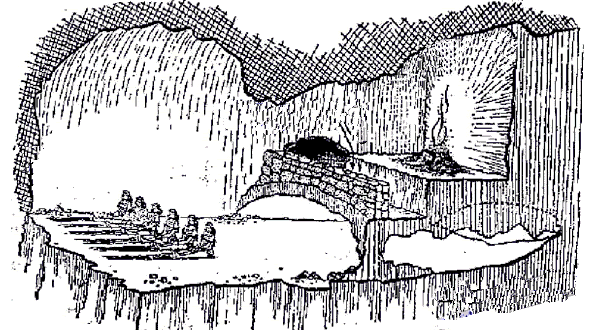
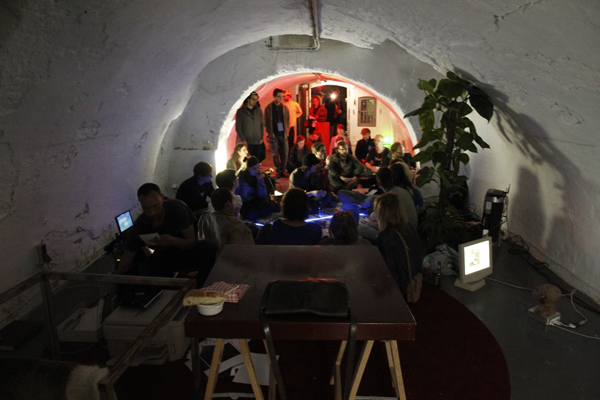

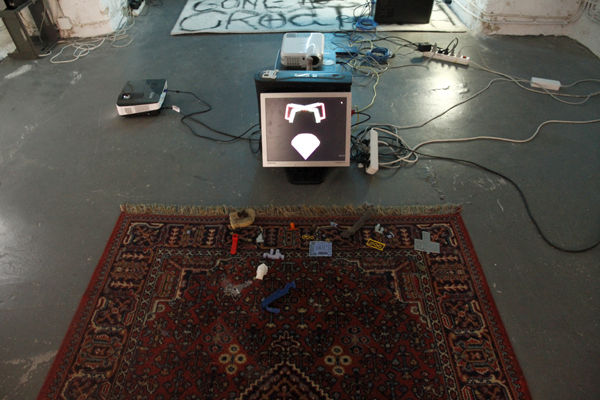
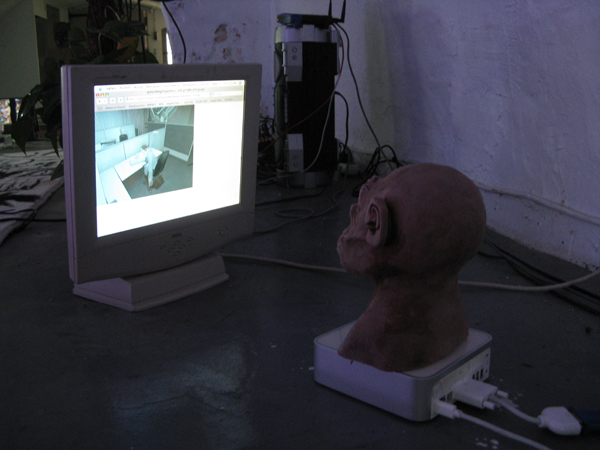
Gif Cave – Umberlina Cave (2012)
An allegory to Plato's cave. Containing sculptures, drawings, 3D printed objects, portable DVD players modified, projections aGIF compositions, computers, plants and musical instruments. The partially exhibition space and partially social gathering space held lectures and live music concerts. The borders between an art exhibition and social experiment blurred creating an autonomous zone.
The Cave worked as a platform which by stimulating the visitors inspired then to react back to the space. Despite the atmospheric influences, the omposition of the room was important reference to this project. The art objects created were placed in the same hierarchy as the ordinary objects.
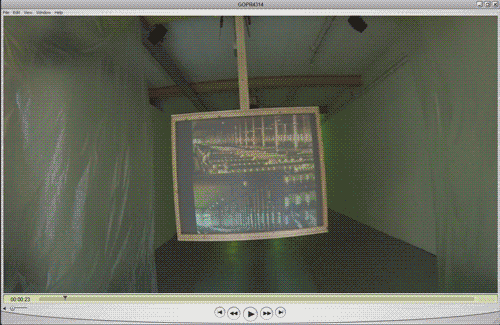
Radical Software (2014)
http://w139.nl/en/article/22280/radical-software/
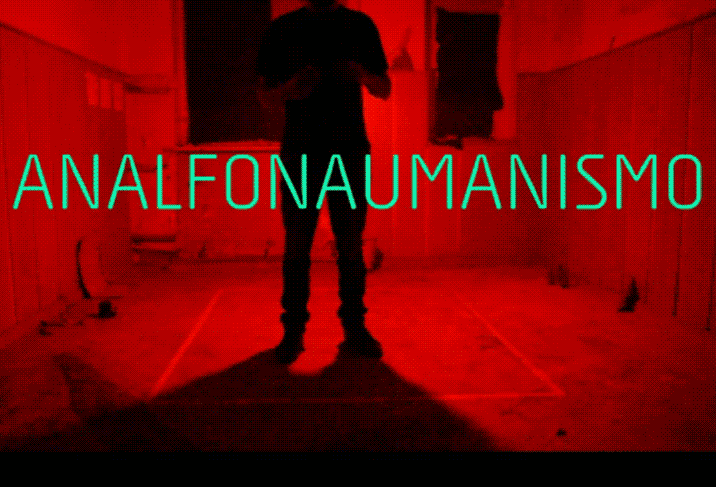
http://eee.ehcaetano.com/selected/red_room_analfonaumismo/
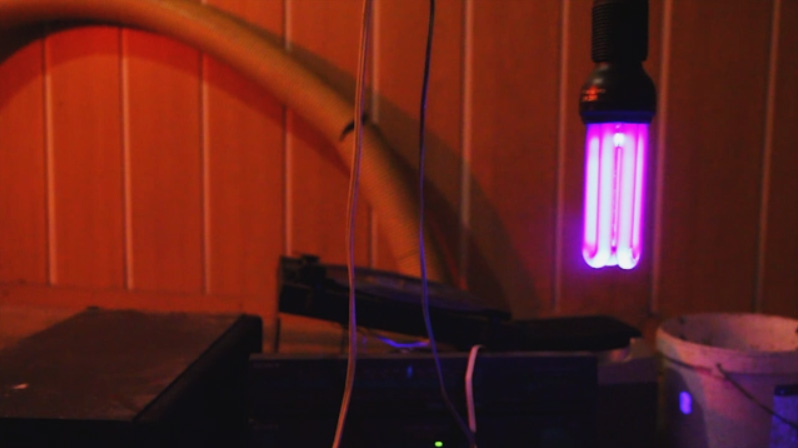
http://eee.ehcaetano.com/selected/RED_ROOM.mp4
On Redroom (2010)
An empirical research on artistic intention. Everyday a new big sculptural project was built without any clear intentions, planed “spontaneous” performances happened inside the space. The overworked time spent in the room created a confusing tension on where to look at to see the art produced, but at the same time expressing the presence of the artistic intentions inside the space. By the end of the residency the room was cleaned and the electric system of the room is fixed, leaving only essential traces of the presence, a light switch, a lamp and a memory.
References:
Mute Magazine Vol 2 #15 2010 “Grey Goo Grimoire”, Essay “Against Representation: A revolution in front of you” by Mattin, pag. 111
Society of The Spectacle – Guy Debord
APOCALIPOPOTESIS (APOCALIPOPOTESE) – 1969 – essay by Helio Oitica

